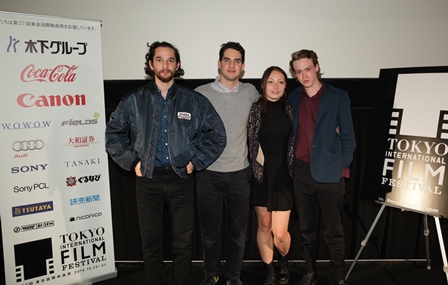Report on Heaven Knows What TIFF 2014, press conference, Oct. 28

©2014 TIFF
“HEAVEN KNOWS WHAT“, directed by Josh Safdie, Benny Safdie won the Tokyo Grand Prix at 27th TIFF
Josh Safdie, Benny Safdie
Director/Screenplay : Joshua Safdie
Director/Editor : Benny Safdie
Screenplay/Editor : Ronald Bronstein
Cinematographer : Sean Price Williams
Production Designer : Audrey Turner
Producer : Oscar Boyson, Sebastian Bear-McClard
Executive Producer : Charles-Marie Anthonioz, Mourad Belkeddar, Jean Duhamel, Nicolas Lhermitte
Casting Director : Eléonore Hendricks
Arielle Holmes
Caleb Landry Jones
Buddy Duress
Heaven Knows What opens with dissonant music, the sound of sobbing and indistinct characters moving in and out of focus, subsuming the viewer immediately in a harrowing world that few of us have experienced, either on the screen or in life. Based on the memoirs of homeless junkie Arielle Holmes, who plays a somewhat fictionalized version of herself in the film, it is the third narrative feature from New York indie darlings Joshua and Benny Safdie. The siblings are primarily known for bittersweet comedy-dramas, like the autobiographical Daddy Longlegs, which premiered at Cannes in 2009. But with this TIFF competition entry, they immediately establish themselves as masters of a visceral intensity we haven’t seen since John Cassevetes.
Harley (Holmes) is madly in love with Ilya (Caleb Landry Jones, of X-Men: First Classand Friday Night Lights), a fellow heroin addict who treats her with impossible cruelty when he’s not stalking her or completely ignoring her. After a failed suicide attempt, Harley falls in with Mike (Buddy Duress), who seems more interested in the score than he is in her, but is savvy enough to be dealing, not just using. These young dropouts spend their days arguing, stealing, panhandling and jonesing for their next fix. As they head inexorably toward oblivion, we want to close our eyes — but their naked desperation makes for utterly compelling viewing. So we watch as they update their social networks at the library; steal mail in the hopes of finding cash; shoplift energy drinks and resell them for a markup; and pay a few bucks to stay overnight with a lonely woman who has a rent-controlled apartment and wants to sell dreamcatchers.
Written by the Safdies with Ronald Bronstein, and shot by Sean Price Williams in masterful longshots and disconcertingly close-up fragments, Heaven Knows Whatgets under our skin like an unwanted drug, forcing us to feel for these poor, lost souls. Holmes is raw and unpolished, but completely transfixing on screen, her character barely able to function much of the time, but charismatic nonetheless. Jones is unrecognizable, filthy, feral, frightened and frightening, a far cry from the clean-cut but troubled youths he’s made his specialty.
Asked during the TIFF press conference about playing herself, Holmes explained, “There was acting in the sense that we were recreating moments from something that happened, but even though I’d experienced them before, I wasn’t feeling the emotions that I felt when it happened.” Benny Safdie added, “To play yourself, but to do so in a way that’s natural and free and feels effortless, is a very difficult thing to do.”
Jones was asked several times about playing the role, and struggled each time to answer. Benny intervened, “Caleb was very immersed in the role, so it was hard for him to come out of it and look at it from another perspective.” Jones nodded. “I’m not quite sure what happened all the time. It was a very real experience, and it’s difficult to talk about it.”
The brothers were lauded for taking overdone subjects and finding an original way to depict them. They cited Cassavetes as a major influence, as well as Larry Clark’sKids, Jerry Schatzberg’s Panic in Needle Park and Mike Leigh’s Naked. Ariel said, “You mention the cliché subjects of the film – drugs, love, homelessness. I feel like a lot of other movies that tell stories like this don’t have a [personal] perspective. Although they never experienced it themselves, through me, Josh and Benny were able to translate the subjects into film. Without firsthand experience, it wouldn’t have been as genuine.”
“I have friends and family who battled some addiction, but no homelessness,” agreed Josh.
As for the [originality of] the form, it came from the subject, and the world of the subject. The fact that this whole film takes place on the street, temporally the street was guiding us to the style. When I talked to the cinematographer, we talked about National Geographic movies sometimes, where you’re very far away, filming wild life.
Noted Benny, “We didn’t want to do something that portrayed the same [old] thing, but we wanted to put ourselves at a distance as well as being very close to it.”
The directors were also asked about the film’s extensive use of Japanese musician Isao Tomita’s synth arrangements of Debussy, Josh responded: “I discovered him about seven or eight years ago, and we wanted something in the tradition of sturm und drang with something very romantic, but like you’re in an alien landscape. Debussy’s is some of the most romantic music ever written, but it’s translated through the mind of Tomita.”
 Chatelin Bruno
Chatelin Bruno 



























